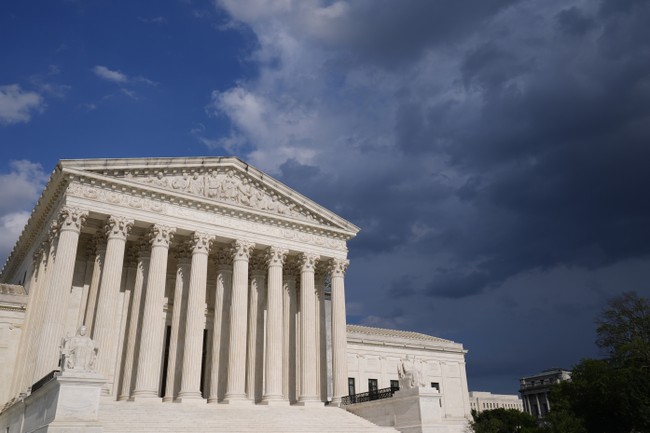


The Supreme Court ruled in a unanimous decision today that the lower court must reconsider the reverse-discrimination case of an Ohio woman who claims she was fired because she is straight.
Petitioner Marlean Ames was hired by the Ohio Department of Youth Services in 2004 and worked in various roles in the agency. In 2018, her boss, who is gay, conducted a performance evaluation and found that her work met or exceeded expectations in all categories. In 2019, she applied for a new position within the agency, but was passed over for another candidate—a lesbian. Then it got worse. The agency not only demoted Ames from her administrative position and reduced her pay, but also replaced her with a gay man.
She sued under Title VII of the Civil Rights Act of 1964, claiming she was discriminated against due to her sexual orientation.
The 6th Circuit Court denied her relief in Ames v. Ohio Dept. of Youth Services. Amy Howe at SCOTUSblog explained:
The U.S. Court of Appeals for the 6th Circuit threw out Ames’s sexual orientation claim. It explained that because she is straight, she was required to show “background circumstances” to support her allegations of reverse discrimination. And although plaintiffs usually make this kind of showing, the court of appeals suggested, with evidence that a member of a minority group made the allegedly discriminatory decision, or with evidence demonstrating a pattern of discrimination against members of the majority group, Ames cannot do either. The decision-makers in her case – the people who hired someone else for the bureau chief job and who demoted her – were also straight, and there is no “pattern” of reverse discrimination beyond her own case, the court of appeals reasoned.
In an opinion authored by none other than the uber-liberal Ketanji Brown Jackson, a unanimous Court ruled that the lower court must reconsider the case and exclude the "background circumstances" standard:
The Sixth Circuit’s “background circumstances” rule requires plaintiffs who are members of a majority group to bear an additional burden at step one. But the text of Title VII’s disparate-treatment provision draws no distinctions between majority-group plaintiffs and minority-group plaintiffs. The provision focuses on individuals rather than groups, barring discrimination against “any individual” because of protected characteristics. Congress left no room for courts to impose special requirements on majority-group plaintiffs alone. [Emphasis added]
The majority opinion explained that "the standard for proving disparate treatment under Title VII does not vary based on whether or not the plaintiff is a member of a majority group." Moreover, "the 'background circumstances' rule—which subjects all majority-group plaintiffs to the same, highly specific evidentiary standard in every case—ignores the Court’s instruction to avoid inflexible applications of the prima facie standard."
The Court concluded, "The Sixth Circuit has implemented a rule that requires certain Title VII plaintiffs—those who are members of majority groups—to satisfy a heightened evidentiary standard in order to carry their burden under the first step of the McDonnell Douglas framework. We conclude that Title VII does not impose such a heightened standard on majority group plaintiffs. Therefore, the judgment below is vacated, and the case is remanded for application of the proper prima facie standard."
Justice Clarence Thomas, in an opinion joined by Justice Neil Gorsuch, excoriated the lower court's decision. "Judge-made doctrines have a tendency to distort the underlying statutory text, impose unnecessary burdens on litigants, and cause confusion for courts. The 'background circumstances' rule—correctly rejected by the Court today—is one example of this phenomenon."
He called out the "background circumstances" standard, noting, "The rule requires a majority-group plaintiff to prove, in addition to the standard elements of a Title VII claim, that background circumstances 'support the suspicion that the defendant is that unusual employer who discriminates against the majority.' This additional requirement is a paradigmatic example of how judge-made doctrines can distort the underlying statutory text." He also pointed out that nothing in Title VII requires this extraneous standard.
Indeed, textualists have been arguing this for as long as I can remember. It's refreshing—in fact, nearly breathtaking—to see the liberal justices standing up for a plain reading of the statute rather than imposing their personal feelings into it. (It's worth reading Thomas's detailed explanation of how bizarre it is to try to sort people into amorphous demographic categories in the first place.)
But Thomas wasn't finished. He let loose in a scathing footnote:
The “‘background circumstances’” rule is nonsensical for an additional reason: It requires courts to assume that only an “‘unusual employer’” would discriminate against those it perceives to be in the majority. But, a number of this Nation’s largest and most prestigious employers have overtly discriminated against those they deem members of so-called majority groups. American employers have long been “obsessed” with “diversity, equity, and inclusion” initiatives and affirmative action plans... Initiatives of this kind have often led to overt discrimination against those perceived to be in the majority.
The case now goes back to the lower court, where Ames will have to argue the merits based on the evidence rather than the higher standard the Court had imposed on her as a member of a majority group.
Editor's Note: Unelected federal judges are hijacking President Trump's agenda and insulting the will of the people
Help us expose out-of-control judges dead set on halting President Trump's mandate for change. Join PJ Media VIP and use promo code FIGHT to get 60% off your membership.
